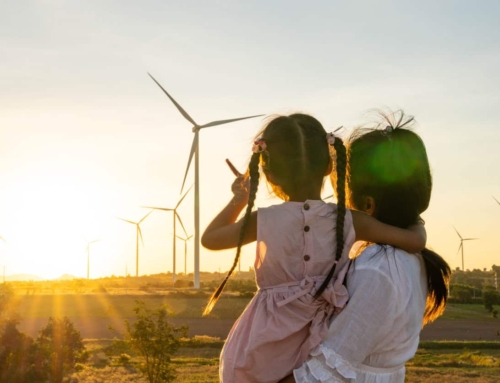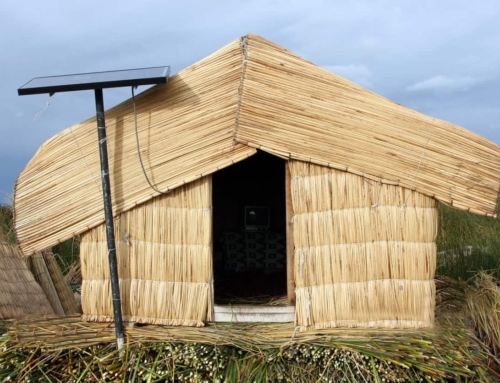We Need to Pivot to Our Own.
I am giving testimony to an administrative law judge on the impact of climate change on Minnesota crops, and why we shouldn’t allow a dirty tar sands pipeline to be built in our state. There are three hundred people in the room. To my left are about 40 union members, Local 49, all wearing identical yellow “Support-the-Pipeline” T-shirts. After my testimony, I decide to talk to them.
I introduce myself to one of their spokespeople and ask why they are supporting the pipeline. He answers that it is because they want the jobs.
Cleverly, I think I have an answer. I believe it to be a well-reasoned and supported by facts. I tell him that clean energy is producing more jobs than oil in Minnesota by threefold.
He looks at me for a few long seconds, like I’m from Mars, then answers, “We want those jobs too.”
Bam! I’ve fallen into the trap of accepting and using the dominant narrative. In this case, the economic narrative of which the jobs story is just one story. This one simple narrative may determine if we put the equivalent of 40 black smoking coal plants into Minnesota.
A narrative is a high-level set of stories that combine to create a worldview. The stories we tell help build our cultures, identities, and communities. Together, they are often based on the same or similar values.
For example: In America, hard work will make you a success regardless of where you come from or your background. This narrative is supported by a strength and individualism set of values. Combine this with the Go-to-college story and the lazy welfare story and they begin to form the work hard and get ahead story of the economic narrative. Together they start to create a worldview that influences public policy and social norms. They become a shorthand way to understand the world. Mostly without thinking. Regardless of whether your hard work is getting you ahead.
A narrative, as a cultural story, becomes dominant when some of us accept it as being true. Strangely, it doesn’t take a majority to believe in the narrative for it to be effective. Like frames, narratives often present a one-sided view of a subject.
Today, there is a science isn’t true narrative that is made up of stories about masks, vaccines, and conspiracy theories. It is rooted in distrust of the elites, i.e. scientists and doctors. Again, it doesn’t take a majority to have this narrative become accepted enough to disrupt public policy. Combine it with the economic narrative and suddenly we have the highest pandemic death rate in the world and are arguing about whether we return to work so the economy can survive. We must make sacrifices for the economy, even when we have to die.
In the case of my conversation with the union leader, the narrative was economic and the story was simply, “All jobs are good.” That hard work is rewarded. Told often enough, narratives become part of society’s accepted worldview.
Some narratives are literally true, or contain an element of truth, while others are outright false. For example, if you are a Black American, with a history of slavery, and still facing racism, will your hard work be rewarded? Can you really get ahead? How is hard work rewarded when weath is accumulated more and more by fewer and fewer. When a narrative becomes dominant, it is woven into our laws, policies and culture. For example, “There is no need to extend unemployment benefits during a pandemic because it only helps those that don’t want to look for work.”
When we understand the dominant narratives that are inhibiting action on the climate crisis, we can avoid an unconscious acceptance of them and avoid reinforcing them with our own communications.
There are many dominant narratives, but here are three that are particularly bankrupt, and I’ll write about them in other posts. They are
- The Economic Narrative
Corporations know best, corporations provide jobs, jobs are good, jobs provide money, money allows you to consume and makes you happy, consumption is good for the economy. Note this is also a fear-based narrative, the use of which is quite common on the right. Be afraid if we don’t lower taxes the economy will fail! Climate is often framed as an economic issue.
- The Doubt, Sacrifice, and Helplessness Narrative
Things are not certain; i.e. climate change or pandemic causes. It’s your fault. i.e. You’re overweight or drive a car. So you’re going to need to sacrifice. It’s beyond your control. There is nothing you can do about it.
- The Strength Narrative
Those in power know best. Our way is the only way because we are strong. Because you are helpless, you need us. We will save you. This narrative contains elements of gender, racism and nationalism as well.
In the climate movement, we must pivot to our own narratives. Like frames, we cannot overcome the dominant narratives by attacking them directly or using them ourselves. This only reinforces them. While jobs provide a logical reason to support clean renewable energy, it only reinforces the idea that the economy is more important than people’s lives. Ask yourself, who is the economy? Reason and facts are not as powerful as narratives and stories, and we can not rely on them to create change.
So what are these climate narratives? (I’ll expand in other posts.)
- The Climate Justice Narrative
We are all connected, and BIPOC are disproportionately affected by climate and pollution. Issues of poverty, racism, health, and climate are connected.
- The Natural World Narrative
We are part of the earth and the natural world is beautiful and supports us. We can use the natural processes of nature to restore the balance of the earth.
- The Generational and Purity Narrative
We must act to preserve the purity of our environment for the next generations.
- The Health Narrative
Changes in our environment and the climate are affecting all of our health.
- The Faith Narrative
God didn’t give us dominion over the world to destroy it. He/she made us stewards of the world.
All of these are based on the values of caring, empathy, respect for the dignity of life, inclusiveness, fairness, and family. They appeal to many conservatives as well and can attract people who are in the middle on climate.
So, when we say clean energy provides jobs, this may be true, but we are supporting the narrative that jobs and the economy are the only thing that is important, even jobs that damage our health and climate. It would be better to pivot to the health or climate justice narrative.
This is what it might sound like, in this case combining the issue of climate and health.
- Our wellbeing is connected. My health is linked to yours and yours to mine. Making millions of people vulnerable to this dangerous COVID virus or the destroying out climate is a choice that we don’t have to make.
- But some politicians are more interested in protecting insurance, big pharmaceutical, and big oil corporations than helping us get the testing and treatment we need, or even breathing clean air.
- There are proven solutions to the problems we face. We need leaders who are willing to look into why Black, brown and Indigenous people are suffering more from climate and COVID and take action to protect everyone’s health, no exceptions.
- We must come together to demand clarity on how this virus is impacting each community, how climate is affecting us all and implement proven strategies like renewable energy and universal health coverage that ensure every one of us, regardless of where we live or what our color, gets the care and treatment that we need and ensure a safe future.
If we want to change the future, we can’t just rely on elections. We need to change our underlying values as a society. We need to take local responsibility for our actions to restore our enviroment rather than waiting for some new leader or our government. Rather than simply arguing against the bankrupt dominant narratives as we have for so long, we can pivot to new narratives and actions.
Where does your story fit in these new narratives? Thanks for all you do,
Hobie,
‘We are all connected. Savor the Earth!’™
Hobart Stocking
SkyWaterEarth.com
hobart@skywaterearth.com
651-357-0110
Facebook: @SkyWaterEarthConnected
Twitter: @SkyWaterEarth








Excellent and very informative. Thank you Hobie.